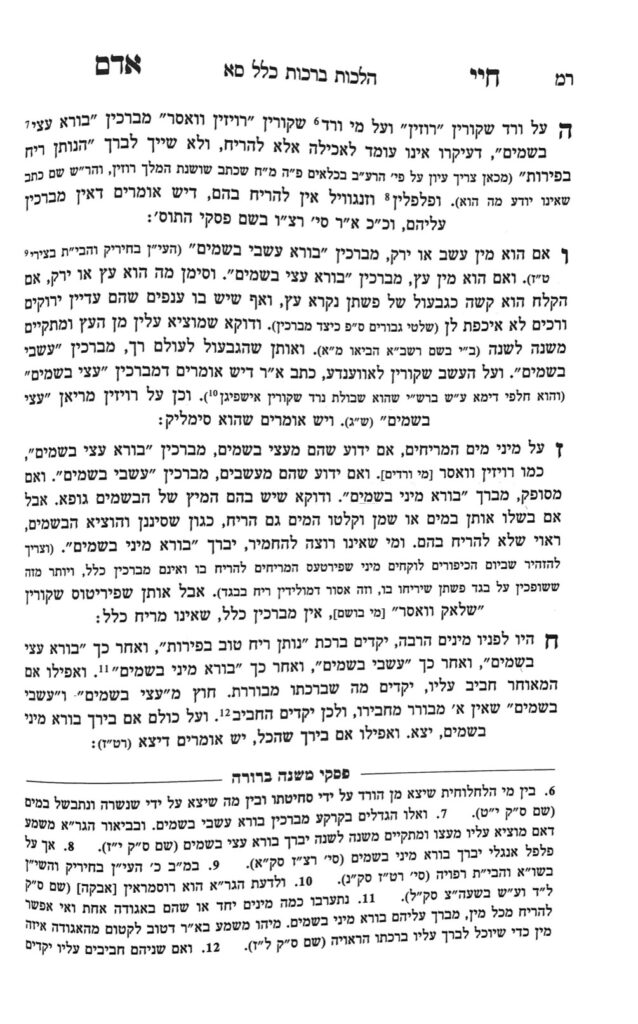We are continuing in siman 7. We will review the halachos we have learned thus far, and discuss some practical applications.
The Chayei Adam wrote that if a liquid has an intrinsic smell, such as tzari sap, one makes the bracha of borei shemen areiv.
Olives or other fruits which are crushed to produce a liquid, and have an intrinsic smell, are borei atzei besamim according to the Shulchan Aruch (the Chayei Adam does not discuss this case).
If an item which would be borei atzei besamim or borei isvei besamim imparts its smell into a liquid, the liquid itself does not have an intrinsic smell, so it will only receive a bracha if some of the source item is still in the liquid. The liquid will receive the corresponding bracha of the source item.
If there are multiple source items in a liquid, the bracha is borei minei besamim, since there are multiple minim (items) in the liquid.
If the source item is removed from the liquid, the argument can be made that since the liquid has absorbed the smell, it can be considered rei’ach she’yeish bo ikar and one can still make a bracha. On the other hand, the argument can be made that since the source is no longer present, it is considered rei’ach she’ein bo ikar and does not receive a bracha. Due to the machlokes, the Chayei Adam writes that one should refrain from smelling the item.
One application of these halachos includes when one takes a liquid which has an intrinsic smell and mixes it into a larger body of liquid. One will make a bracha as long as the source liquid can be smelled, and there is no proportion at which we would apply bitul (nullification of the smell due to the proportion).
Another application of these halachos regards smells created through a chemical process. The body recognizes smell by identifying certain molecules in the nerve endings which pick up smells. If one can identify that molecule, it can be replicated in a laboratory even if it is not natural, per se. Based on what we have learned, such a smell could be considered a rei’ach she’ein bo ikar and should be no different than any liquid which has no intrinsic smell nor source item in it. However, the argument can be made that since these chemicals are inherently the source item of the smell (even if that source item is synthetic), maybe it is considered a rei’ach she’yeish bo ikar. Therefore, the suggestion of the Chayei Adam to avoid smelling an item with such a safeik would seem to apply here as well. However, Rav Elyashiv and Rav Shlomo Zalman Auerbach both held that one does not make a bracha in this situation.
A smell whose source is an animal receives the bracha of borei minei besamim, because it emanates from a natural source.
Summary
- One makes a bracha on a good-smelling liquid, provided that the item itself has an intrinsic smell.
- If the liquid does not have an intrinsic smell, one will still make a bracha, provided that:
- The source of the smell is an item which itself is eligible for a bracha
- Part of the original item is squeezed or crushed into the item
- If the liquid does not have part of the original item in it, one should refrain from smelling it. If one does decide to smell it, they should make the bracha of borei minei besamim.
- A liquid with multiple source items, and therefore multiple smells, receives the bracha of borei minei besamim.
- A liquid with an intrinsic smell which is mixed into a larger body of liquid will still receive a bracha, regardless of the proportion of new liquid to the smell, provided one can still smell the original smell.
- Synthetic or chemical smells do not receive a bracha. One should refrain from smelling it to avoid any shaalos.
- A smell whose source is an animal receives the bracha of borei minei besamim.



